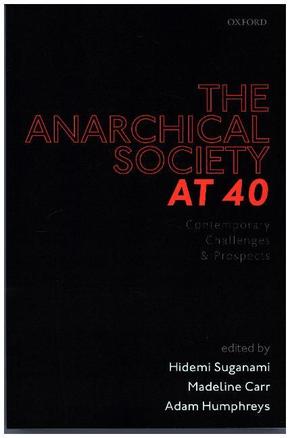The Anarchical Society at 40 - Contemporary Challenges and Prospects
| Verlag | Oxford University Press |
| Auflage | 2017 |
| Seiten | 384 |
| Format | 15,8 x 23,6 x 2,0 cm |
| Print PDF | |
| Gewicht | 561 g |
| Artikeltyp | Englisches Buch |
| ISBN-10 | 0198805144 |
| EAN | 9780198805144 |
| Bestell-Nr | 19880514EA |
First published in 1977, Hedley Bull's The Anarchical Society is one of the classic texts in International Relations. This volume revisits Bull's work, providing new readings of the text, developing new criticisms and exploring its relevance to a wide range of contemporary issues in world politics.
Hedley Bull's The Anarchical Society was published in 1977. Forty years on, it is considered one of the classic texts in International Relations. It does not, however, address many world political issues that now concern us deeply, such as terrorism, global financial crises, climate change, the impact of the internet revolution, deep-rooted racial inequalities, and violence against women. Moreover, while the development of International Relations as an academic subject has consolidated the status of the 'English School' as one of the principal approaches to the study of world politics, and The Anarchical Society as its key text, significant limitations in Bull's approach have also been identified.
This volume examines how far The Anarchical Society continues to illuminate world politics and how well Bull's method and argument stand up today. The volume argues that although many of Bull's substantive judgements require updating, his approach remains valuable, not only for thinking about enduring problems of violence and security, but also, as a starting point, for thinking about many issues that Bull himself neglected. However, the contributors also develop important criticisms of Bull's approach and identify ways in which it could be strengthened. A key insight is that although The Anarchical Society is famous for explicating the concept of 'international society', there is more to it than that. Indeed, the contemporary relevance of Bull's work is clearest when we recognize the often overlooked potential of his concept of the 'world political system', referring to the global network of interactions of which modern international society is only a part.
Inhaltsverzeichnis:
Introduction
1: Hidemi Suganami: Bull and The Anarchical Society Now at 40
Part I: Reading The Anarchical Society 40 Years on
2: Hidemi Suganami: The Argument of The Anarchical Society
3: Richard Falk: Ordering the World: Hedley Bull after 40 Years
Part II: Three Foundational Critiques
4: William Bain: The Anarchical Society as Christian Political Theology
5: Christian Reus-Smit: The Anarchical Society and Human Rights
6: Mustapha Kamal Pasha: Decolonizing The Anarchical Society
Part III: The Anarchical Society and World Politics 40 Years on
7: Robert Ayson: The Anarchical Society and the Control of Global Violence
8: Jan Ruzicka: A Plea for Restraint: The Anarchical Society and Nuclear Proliferation
9: Harmonie Toros and Filippo Dionigi: International Society and Islamist Non-state Actors: The Case of the Islamic State Organization
10: Madeline Carr: Cyberspace and International Order
11: Louis W. Pauly: The Anarchical Society an d a Global Political Economy
12: Robert Falkner: The Anarchical Society and Climate Change
13: Paul Keal: The Anarchical Society and Indigenous Peoples
14: Jacqui True: Anarchy and Patriarchy in World Politics
Part IV: Augmenting The Anarchical Society
15: Heikki Patomäki: The Anarchical Society as Futurology
16: Katarzyna Kaczmarska: International Society Encounters the Russian World: the Role of Representations in International Relations
17: Andrew Linklater: The International Society of 'Civilized States'
Conclusion
18: Adam Humphreys: Bull's Political Vision

